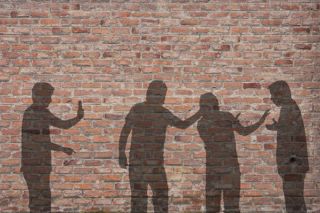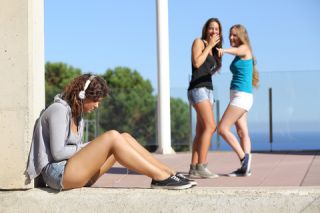Bullying
Emotional Healing From Peers During the "Old School Days"
Sometimes, we're hurt by peers when we were young. The inner unrest can remain.
Posted November 24, 2023 Reviewed by Ray Parker
Key points
- Being mistreated by peers during adolescence is common, with about 20% reporting such incidents.
- Studies show a relationship between adolescents having lower self-esteem and being bullied by peers.
- Forgiving those who mistreated us can help us heal and recover our self-esteem.

A best friend may have betrayed your carefully guarded secret when you were in middle school. The tough guy at school possibly pushed you around.
The peer group perhaps made fun of you and laughed at your expense in the hall of your high school. In a national survey (NCES, 2019), approximately 20 percent of students in middle school and high school reported being unjustly treated, in a profound way, by peers.
Peer Conflict as a Youth and Low Self-Esteem
In a study of over 3,000 students with an average age of 14.3 in Slovakia, those who were bullied or had poor relationships with peers tended to have the lowest self-esteem (Sarkova et al., 2014).
In an Australian study with over 900 students, ages 7 to 12, the research again showed that those who were treated unjustly by peers tended to have lower self-esteem (Skues et al., 2005). The connection between being treated unfairly by peers and low self-esteem can occur even without face-to-face contact, but instead can occur through phone bullying (Drennan et al., 2011).
In other words, regardless of the way in which the injustice occurs, there is a tendency for those who are treated unfairly to believe the lie that they are less than they truly are as persons. Similar to the above findings regarding self-esteem, a study with over 600 Portuguese adolescent girls showed a statistically significant correlation between peer victimization and the report of depressive symptoms (Duarte, Pinto-Gouveia, & Rodrigues, 2015).
Finally, in a rather definitive meta-analysis involving 121 studies, there was a statistically significant relationship between being bullied and self-esteem. The more a child or adolescent is bullied, the lower the victim's self-esteem.
The association between peer injustices and negative psychological outcomes is not confined only to the present time. A study by Lereya et al. (2013) of 4,810 children (ages 7 to 10) in the United Kingdom showed that those who were bullied had both depressive and self-harm symptoms up to 10 years later. In other words, the effects of peer injustice seemed to stay with those who were bullied.

These findings of a poor self-image and negative psychological outcomes that can linger are important for us to note. It is especially important to realize that it is in adolescence that people begin to develop their sense of identity (Erikson, 1968). If an adolescent is victimized by peers' unjust behavior and begins to form an identity that "I am not a worthwhile person," this could form part of the person's stable sense of self over time.
The implication is this: It may be challenging to shed the lie of being unworthy as it fuses with the person's sense of identity, of who this person is at the core. We, therefore, need to find an effective way of healing the hurt caused by the unjust treatment and, at the same time, recover victims' self-esteem and the sense that they have inherent worth as persons.
A Way Forward
It is time to reflect on those good old school days of yore, those carefree days when everyone thought we did not have a care in the world. Yet, sometimes, we carry burdens from those days and do so in the silence of our hearts. When was the last time that you, as an adult, had a discussion about your days in elementary, middle, or high school? When was the last time you had such a discussion with an emphasis on the emotional wounds you received back then? I am guessing that such discussion times have been quite rare.
I wonder how many of you reading this still have some unresolved issues from the good old days. It is in school, within the peer group, at recess, and on the sports team that our current sense of self is shaped, at least to a degree. Sometimes, we are influenced by those days to a greater extent than we realize.
So, it is time for a quiz.
Please think about your days in school and see if you can identify one person who was unjust to you, so unjust that when you think about the person now, it hurts. This person is a candidate for your forgiveness. I have important questions for you:
- How has this person inadvertently influenced your own view of yourself?
- How has this person's actions made you feel less than who you really are?
- Do you see that it is time to change that?
A paradox of forgiveness is this: As you see the wounds in the one who wounded you, then you slowly begin to see the inherent worth of this person, not because of the unfair treatment but in spite of this. As you grant personhood to the one who bullied, was insensitive, or embarrassed you, you begin to recover your own true identity as a person of worth.
Our forgiveness research programs show this to be the case. For example, Freedman and Enright (1996), in working with adult female incest survivors, helped them to forgive their perpetrators. One important result was the recovery of the participants' own self-esteem, one's own worth.
The same occurred in Reed and Enright (2006) with women who were divorced and in people within a residential drug rehabilitation center (Lin et al., 2004). In each case, those who were treated deeply unjustly by others came to us not liking themselves. Forgiving the ones who were unjust helped the participants to recover their own sense of self-esteem.
My challenge to you today is to take steps to forgive the person for those behaviors long ago that may be influencing you up to this very moment. It is time to take a better look at what happened, to forgive, and then to ask the question after you forgive: Who am I now as I admit to the injustice, admit to it negatively influencing how I have seen myself all these years, and who I am now as I stand in forgiveness?
Perhaps the "old school days" will seem a little brighter once you forgive. You will have lifted a silent burden.
References
Drennan, J., Brown, M.R. and Sullivan Mort, G. (2011), Phone bullying: Impact on self‐esteem and well‐being. Young Consumers, 12, 295-309. https://doi.org/10.1108/17473611111185850
Duarte, C., Pinto-Gouveia, J. & Rodrigues, T. (2015). Being bullied and feeling ashamed: Implications for eating psychopathology and depression in adolescent girls. Journal of Adolescence, 44, 259-268.
Erikson, E. (1968). Identity: Youth and crisis. New York: Norton.
Freedman, S. R., & Enright, R. D. (1996). Forgiveness as an intervention goal with incest survivors. Journal of Consulting and Clinical Psychology, 64(, 983-992.
Lereya, S.T., Winsper, C., , Heron, J., Lewis, G., Gunnell D., Fisher, H.L., & Wolke, D. (2013). Being bullied during childhood and the prospective pathways to self-harm in late adolescence. Journal of the American Academy of Child & Adolescent Psychiatry, 52, 608-618.
Lin, W.F., Mack, D., Enright, R.D., Krahn, D., & Baskin, T. (2004). Effects of forgiveness therapy on anger, mood, and vulnerability to substance use among inpatient substance-dependent clients. Journal of Consulting and Clinical Psychology, 72, 1114-1121.
National Center for Educational Statistics. (2019, July). Student reports of bullying results from
the 2017 school crime supplement to the national crime victimization survey. Retrieved
from https://nces.ed.gov/pubs2019/2019054.pdf
Reed, G. & Enright, R.D. (2006). The effects of forgiveness therapy on depression, anxiety, and post-traumatic stress for women after spousal emotional abuse. Journal of Consulting and Clinical Psychology, 74, 920-929.
Sarkova, M., Bacikova-Sleskova, M., Madarasova Geckova, A., Katreniakova, Z., van den Heuvel, W., & van Dijk, J.P. (2014) Adolescents’ psychological well-being and self-esteem in the context of relationships at school, Educational Research, 56, 367-378, DOI: 10.1080/00131881.2014.965556
Skues, J. L., Cunningham, E. G., & Pokharel, T. (2005). The influence of bullying behaviours on sense of school connectedness, motivation and self-esteem. Journal of Psychologists and Counsellors in Schools, 15, 17-26.
Tsaousis, I. (2016). The relationship of self-esteem to bullying perpetration and peer victimization among schoolchildren and adolescents: A meta-analytic review, Aggression and Violent Behavior, 31, 186-199.




